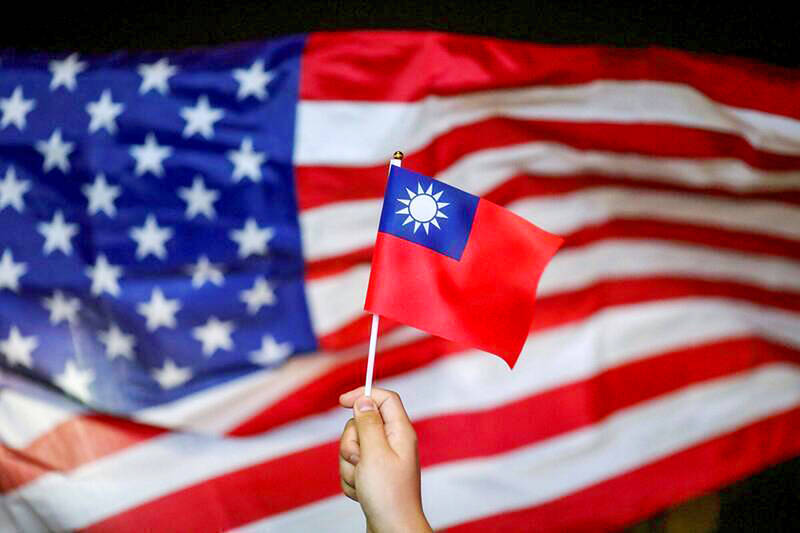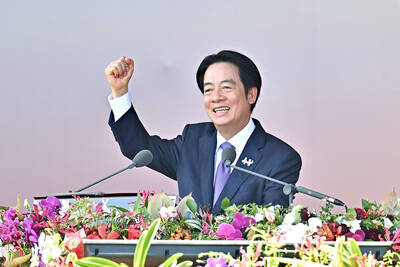A series of US government actions aimed at deepening ties with Taipei and expanding its participation in international organizations are important for regional stability and investor confidence, the American Chamber of Commerce in Taiwan (AmCham) said yesterday in a statement published on its Web site.
The business group said it supports a hearing scheduled for Wednesday next week by the US Senate Committee on Foreign Relations, which would review several pieces of Taiwan-related legislation designed to boost its security, economic links and its role in the global community amid rising tensions with China.
“The bipartisan initiatives reflect a growing recognition in Washington of Taiwan’s strategic and economic importance,” AmCham said, adding that their passage would help reinforce stability in the Indo-Pacific region and bolster confidence in the rules-based international order.

Photo: Reuters
The chamber also welcomed US Secretary of Transportation Sean Duffy’s comments urging Taiwan’s participation in the technical work of the International Civil Aviation Organization.
Duffy’s remarks align with its long-standing advocacy for Taipei’s inclusion in international aviation forums, it said, adding that safety and technical collaboration “should transcend politics.”
“Taiwan’s Civil Aeronautics Administration manages one of the busiest flight information regions in Asia, overseeing more than a million flights annually,” AmCham said. “Its expertise and responsible oversight are integral to the safety and efficiency of global aviation.”
AmCham, which represents more than 500 international and local member companies, said that it also backs the National Defense Authorization Act for fiscal year 2026, which reaffirms US support for Taiwan’s self-defense and participation in multilateral institutions.
Next week’s hearing would consider four major bills, including the Providing Our Regional Companions Upgraded Protection in Nefarious Environments Act, which would accelerate US arms sales to Taiwan by granting it “NATO Plus” treatment, and the Taiwan International Solidarity Act, which says that Taiwan’s international status cannot be changed without the consent of its people.
In addition, the Deter PRC Aggression Against Taiwan Act would establish a framework for coordinated economic and financial responses to Chinese coercion, while the US-Taiwan Partnership in the Americas Act aims to expand Taipei’s diplomatic and trade ties across Latin America and the Caribbean.
AmCham said the combined effect of the proposed legislation would improve Taiwan’s defense posture, broaden its diplomatic space and deepen economic cooperation — outcomes it described as “essential to maintaining investor confidence and regional prosperity.”
The chamber urged the US Congress and the White House to ensure the timely and effective implementation of the legislation, adding that it is ready to work with policymakers in Taipei and Washington to advance the objectives, and ensure that Taiwan remains a “strong and trusted partner in the international community.”

The Ministry of the Interior (MOI) is to tighten rules for candidates running for public office, requiring them to declare that they do not hold a Chinese household registration or passport, and that they possess no other foreign citizenship. The requirement was set out in a draft amendment to the Enforcement Rules of the Public Officials Election and Recall Act (公職人員選舉罷免法 ) released by the ministry on Thursday. Under the proposal, candidates would need to make the declaration when submitting their registration forms, which would be published in the official election bulletin. The move follows the removal of several elected officials who were

FOUR DESIGNATED AREAS: Notices were issued for live-fire exercises in waters south and northwest of Penghu, northeast of Keelung and west of Kaohsiung, they said The military is planning three major annual exercises across the army, navy and air force this month, with the navy’s “Hai Chiang” (海強, “Sea Strong”) drills running from today through Thursday, the Ministry of National Defense said yesterday. The Hai Chiang exercise, which is to take place in waters surrounding Taiwan, would feature P-3C Orion maritime patrol aircraft and S-70C anti-submarine helicopters, the ministry said, adding that the drills aim to bolster the nation’s offshore defensive capabilities. China has intensified military and psychological pressure against Taiwan, repeatedly sending warplanes and vessels into areas near the nation’s air defense identification zone and across

SENATE RECOMMENDATION: The National Defense Authorization Act encourages the US secretary of defense to invite Taiwan’s navy to participate in the exercises in Hawaii The US Senate on Thursday last week passed the National Defense Authorization Act (NDAA) for Fiscal Year 2026, which strongly encourages the US secretary of defense to invite Taiwan’s naval forces to participate in the Rim of the Pacific (RIMPAC) exercise, as well as allocating military aid of US$1 billion for Taiwan. The bill, which authorizes appropriations for the military activities of the US Department of Defense, military construction and other purposes, passed with 77 votes in support and 20 against. While the NDAA authorizes about US$925 billion of defense spending, the Central News Agency yesterday reported that an aide of US

NATIONAL DAY: The ‘Taiwan Dome’ would form the centerpiece of new efforts to bolster air defense and be modeled after Israel’s ‘Iron Dome,’ sources said President William Lai (賴清德) yesterday pledged to strengthen the nation’s air defense capabilities and build a “T-Dome” system to create a safety net against growing military threats from China. “We will accelerate our building of the T-Dome, establish a rigorous air defense system in Taiwan with multi-layered defense, high-level detection and effective interception, and weave a safety net for Taiwan to protect the lives and property of citizens,” he said in his National Day address. In his keynote address marking the Republic of China’s (ROC) 114th anniversary, Lai said the lessons of World War II have taught nations worldwide “to ensure that